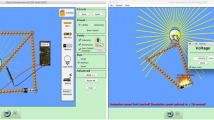Abstract
Although existing computer-based scientific inquiry learning environments have proven to benefit learners, effectively inferring and intervening within these learning environments remain an open issue. To tackle this challenge, this article will firstly address the issue on learning model by proposing Scientific Inquiry Exploratory Learning Model. Secondly, aiming at effective modeling and intervening under uncertainty in modeling learner’s exploratory behaviours, decision-theoretic approach is integrated into INQPRO. This approach allows INQPRO to compute a probabilistic assessment on learner’s scientific inquiry skills (Hypothesis Generation and Variables Identification), domain knowledge, and subsequently provides tailored hints. This article ends with an investigation on the accuracy of proposed learner model by performing a model walk-through with human expert and field trial evaluation with a total number of 30 human students.
Preview
Unable to display preview. Download preview PDF.
Similar content being viewed by others
References
Frederiksen, J.R., White, B.Y.: Teaching and learning generic modeling and reasoning skills. Journal of Interactive learning Environment 5, 33–52 (1998)
Linn, M.C.: Designing the knowledge integration environment. International Journal of Science Education 22, 781–796 (2000)
Pryor, A., Soloway, E.: Foundation of Science: Using Technology to Support Authentic Science learning (1997), http://hi-ce.eecs.umich.edu/papers/
Reiser, B.J., Tabak, I., Sandoval, W.A., Smith, B., Steinmuller, F., Leone, T.J.: BGuILE: Stategic and Conceptual Scaffolds for Scientific Inquiry in Biology Classrooms. In: Carver, S.M., Klahr, D. (eds.) Cognition and Instruction: Twenty five years of progress. Erlbaum, Mahwah (2001)
Shimoda, T.A., White, B.Y., Frederiksen, J.R.: Student goal orientation in learning inquiry skills with modifiable software advisors. Science Education 86, 244–263 (2002)
Paolucci, M., Suthers, D., Weiner, A.: Automated advice giving strategies for scientific inquiry. In: Frasson, C., Gauthier, G., Lesgold, A. (eds.) 3rd International Conference on Intelligent Tutoring Stystems (1996)
Veermans, K., van Joolingen, W.R.: Combining Heuristics and Formal Methods in a Tool for Supporting Simulation-Based Discovery Learning. In: 7th Intelligent Tutoring Systems, Brazil (2004)
Shute, V.J., Glaser, R.: A large-scale evaluation of an intelligent discovery world: Smithtown. Interative Learning Environments 1, 51–77 (1990)
Miller, T., Kretschmer, M., Meyer, T., Steuck, K., Pesthy, C.: Teaching Scientific Inquiry Skills with an Intelligent Tutoring System. In: International Conference on Mathematics / Science Education and Technology, USA (1999)
Jameson, A.: Numerical Uncertainty Management in User and Student Modeling: An Overview of Systems and Issues. User Model. User-Adapt. Interact. 5, 193–251 (1995)
Pearl, J.: Probabilistic Reasoning in Intelligent Systems: networks of Plausible Inference. Morgan Kaufmann, San Francisco (1998)
Murray, R.C., VanLehn, K., Mostow, J.: Looking ahead to select tutorial actions: A decision-theoretic approach. International Journal of Artificial Intelligence in Education 14, 235–278 (2004)
Pek, P.K., Poh, K.L.: Making decisions in an intelligent tutoring system. International Journal of Information Technology and Decision Making 4, 207–233 (2005)
Mayo, M., Mitrovic, A.: Optimizing ITS behaviour with Bayesian networks and decision theory. International Journal of Artificial Intelligence and Education 12, 124–153 (2001)
Kuhn, D., Black, J., Keselman, A., Kaplan, D.: The development of cognitive skills to support inquiry learning. Cognition and Instruction 18, 295–523 (2000)
Löhner, S., Van Joolingen, W.R., Savelsberg, E.R., Van Hout- Wolters, B.: Students’ reasoning during modeling in an inquiry learning environment. Computers in Human Behavior 21, 441–461 (2005)
Ting, C.Y.: Integrating Animated Pedagogical Agent into Scientific Inquiry Model: A Cognitive Tools Perspective. In: IEEE International Conference on Computers in Education 2002, Auckland, New Zealand, December 3-6 (2002)
de Jong, T., van Joolingen, Wouter, R.: Scientific discovery learning with computer simulations of conceptual domains. Review of Educational Research 68, 179–201 (1998)
VanLehn, K.: Student Modeling. In: Polson, M.C., Richardson, J.J. (eds.) Foundations of Intelligent Tutoring Systems, pp. 55–78. Erlbaum, Hillsdale (1988)
Karasavvidis, I., Pieters, J.M., Plomp, T.: Exploring the mechanisms through which computers contribute to learning. J. Comp. Assisted Learning 19, 115–128 (2003)
Chi, M.T.H., Roscoe, R.D.: The processes and challenges of conceptual change. In: Limon, M., Mason, L. (eds.) Reconsidering conceptual change: Issues in theory and practice. Kluwer, Netherlands (2002)
Ting, C.Y., Zadeh, M.R.B., Liau, B.H.: Artificial Student Toolkit for Assessing Bayesian Student Model. In: Proceedings of IEE International Conference on Intelligent Systems (2005)
Author information
Authors and Affiliations
Editor information
Editors and Affiliations
Rights and permissions
Copyright information
© 2006 Springer-Verlag Berlin Heidelberg
About this paper
Cite this paper
Ting, CY., Zadeh, M.R.B., Chong, YK. (2006). A Decision-Theoretic Approach to Scientific Inquiry Exploratory Learning Environment. In: Ikeda, M., Ashley, K.D., Chan, TW. (eds) Intelligent Tutoring Systems. ITS 2006. Lecture Notes in Computer Science, vol 4053. Springer, Berlin, Heidelberg. https://doi.org/10.1007/11774303_9
Download citation
DOI: https://doi.org/10.1007/11774303_9
Publisher Name: Springer, Berlin, Heidelberg
Print ISBN: 978-3-540-35159-7
Online ISBN: 978-3-540-35160-3
eBook Packages: Computer ScienceComputer Science (R0)




